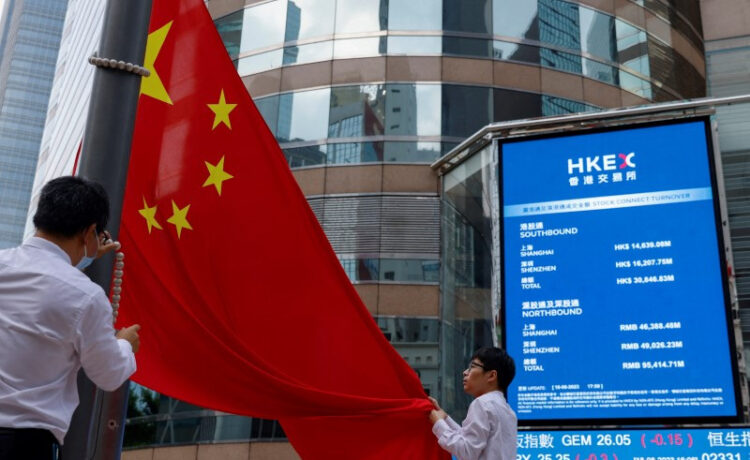By Jamie McGeever
(Reuters) – A look at the day ahead in Asian markets.
With the MSCI World, Japanese Nikkei 225, Nasdaq, S&P 500 and Europe’s STOXX 600 indexes all finishing last week at record highs, Asian markets kick off the new week on Monday with a strong global tailwind behind them.
The resilience of the U.S. economy, cooling inflation and an artificial intelligence-fueled frenzy in big tech are setting the positive tone globally, which should put a spring in Asian markets’ step on Monday.
Industrial production, retail sales and purchasing managers’ index data from South Korea; New Zealand trade and Australian housing figures are the main events on the regional economic calendar, but investors’ attention will be turning to China.
The annual National People’s Congress in Beijing opens on Tuesday and what is laid out by parliament could go a long way to determining the 2024 path for assets in China. And beyond.
Premier Li Qiang will lay out Beijing’s annual growth and other economic targets, and – crucially – a plan for achieving them.
Li is expected to set a growth target of around 5% for 2024 – the same as last year – to keep China on a path toward President Xi Jinping’s goal of roughly doubling the economy by 2035.
If the stimulus policies and measures are credible in the eyes of investors, the rebound in Chinese stocks from the five-year lows a few weeks ago looks likely to continue. If they fail to convince investors, a re-test of these lows in the coming weeks cannot be ruled out.
Chinese leaders are under pressure to take more radical steps to shore up the property sector, ward off deflation and revive growth. But capital outflows have weakened the exchange rate, and large-scale fiscal easing could exacerbate that outflow-declining currency doom loop.
To be sure, some of the recent numbers have been encouraging. The Caixin manufacturing PMI last week was enough to lift China’s overall economic surprises index to its highest level since mid-December.
Expectations have been lowered considerably in recent weeks as the data has underwhelmed, so it’s not clear that this reflects particularly strong economic activity per se. But positive surprises are preferable to negative surprises.
Either way, Chinese equities have regained their footing and are up around 10% from the lows and are now in the green year to date.
Looking ahead to the rest of the week in Asia, the main calendar events are inflation data from South Korea, Thailand, the Philippines and Taiwan, as well as GDP figures from South Korea and Australia, China’s Caixin services PMI, and an interest rate decision from Malaysia.
Here are key developments that could provide more direction to markets on Monday:
– South Korea retail sales, industrial output, mfg PMI
– Australia housing sector data
– New Zealand trade
(By Jamie McGeever; editing by Josie Kao)














